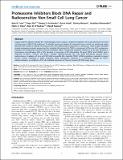| dc.contributor.author | Cron, Kyle R. | |
| dc.contributor.author | Zhu, Kaya | |
| dc.contributor.author | Kushwaha, Deepa S. | |
| dc.contributor.author | Hsieh, Grace | |
| dc.contributor.author | Merzon, Dmitry | |
| dc.contributor.author | Rameseder, Jonathan | |
| dc.contributor.author | Chen, Clark C. | |
| dc.contributor.author | D'Andrea, Alan D. | |
| dc.contributor.author | Kozono, David | |
| dc.date.accessioned | 2013-09-27T16:19:53Z | |
| dc.date.available | 2013-09-27T16:19:53Z | |
| dc.date.issued | 2013-09 | |
| dc.date.submitted | 2013-04 | |
| dc.identifier.issn | 1932-6203 | |
| dc.identifier.uri | http://hdl.handle.net/1721.1/81218 | |
| dc.description.abstract | Despite optimal radiation therapy (RT), chemotherapy and/or surgery, a majority of patients with locally advanced non-small cell lung cancer (NSCLC) fail treatment. To identify novel gene targets for improved tumor control, we performed whole genome RNAi screens to identify knockdowns that most reproducibly increase NSCLC cytotoxicity. These screens identified several proteasome subunits among top hits, including the topmost hit PSMA1, a component of the core 20 S proteasome. Radiation and proteasome inhibition showed synergistic effects. Proteasome inhibition resulted in an 80–90% decrease in homologous recombination (HR), a 50% decrease in expression of NF-κB-inducible HR genes BRCA1 and FANCD2, and a reduction of BRCA1, FANCD2 and RAD51 ionizing radiation-induced foci. IκBα RNAi knockdown rescued NSCLC radioresistance. Irradiation of mice with NCI-H460 xenografts after inducible PSMA1 shRNA knockdown markedly increased murine survival compared to either treatment alone. Proteasome inhibition is a promising strategy for NSCLC radiosensitization via inhibition of NF-κB-mediated expression of Fanconi Anemia/HR DNA repair genes. | en_US |
| dc.description.sponsorship | American Society for Radiation Oncology (Junior Faculty Career Research Training Award) | en_US |
| dc.description.sponsorship | Harvard University. Joint Center for Radiation Therapy (Foundation Grant) | en_US |
| dc.description.sponsorship | Dana-Farber/Harvard Cancer Center (SPORE Developmental Research Project Award in Lung Cancer Research) | en_US |
| dc.description.sponsorship | National Cancer Institute (U.S.) (Award K08CA172354) | en_US |
| dc.language.iso | en_US | |
| dc.publisher | Public Library of Science | en_US |
| dc.relation.isversionof | http://dx.doi.org/10.1371/journal.pone.0073710 | en_US |
| dc.rights | Creative Commons Attribution | en_US |
| dc.rights.uri | http://creativecommons.org/licenses/by/2.5/ | en_US |
| dc.source | PLoS | en_US |
| dc.title | Proteasome Inhibitors Block DNA Repair and Radiosensitize Non-Small Cell Lung Cancer | en_US |
| dc.type | Article | en_US |
| dc.identifier.citation | Cron, Kyle R., Kaya Zhu, Deepa S. Kushwaha, Grace Hsieh, Dmitry Merzon, Jonathan Rameseder, Clark C. Chen, Alan D. D’Andrea, and David Kozono. “Proteasome Inhibitors Block DNA Repair and Radiosensitize Non-Small Cell Lung Cancer.” Edited by A. R. M. Ruhul Amin. PLoS ONE 8, no. 9 (September 5, 2013): e73710. | en_US |
| dc.contributor.department | Massachusetts Institute of Technology. Computational and Systems Biology Program | en_US |
| dc.contributor.mitauthor | Rameseder, Jonathan | en_US |
| dc.relation.journal | PLoS ONE | en_US |
| dc.eprint.version | Final published version | en_US |
| dc.type.uri | http://purl.org/eprint/type/JournalArticle | en_US |
| eprint.status | http://purl.org/eprint/status/PeerReviewed | en_US |
| dspace.orderedauthors | Cron, Kyle R.; Zhu, Kaya; Kushwaha, Deepa S.; Hsieh, Grace; Merzon, Dmitry; Rameseder, Jonathan; Chen, Clark C.; D’Andrea, Alan D.; Kozono, David | en_US |
| mit.license | PUBLISHER_CC | en_US |
| mit.metadata.status | Complete | |
